The "collar flip"....what if class politics shifted in the UK?
Why the rise of AI, might change our politics in the UK (and US!)
In my day job As Chief Research Officer at Focaldata we spend alot of time thinking about the upside of LLMs and AI on research, and also do alot of political modelling. For this post I wanted to delve into the politics and geography of AI exposure; a strange mash-up of our two focusses. The below post is extremely LowFi - I do have a day job.
Generally speaking when people discuss these technologies and jobs they are talking about the capacity of these tools to either “augment” our skills and abilities or replace them entirely. We are still at the foothills of what is and isn’t possible by job occupation and company. The purpose of this blog is to understand in a UK (and US) context how AI-exposure has pretty different geographic impacts. To do this I basically modelled down a metric called the AI Occupational Exposure (AIOE) score to low level geography in the UK. I explain the AIOE below. This was a laborious task that involved lifting the AIOE scores by job detailed and crosswalking this vs the distribution of those jobs by parliamentary constituency.
How do you even work out exposure by job type (AIOE) and then geography? [IGNORE IF UNINTERESTED IN METHODOLOGY]
The starting point for my own cursory look at this is this International Labor Organization’s paper and this 2023 Department of Education paper. Basically whether it’s the US or UK all of the analysis to date of AIOE occupation is driven off a simple matrix which compares Fleischman’s taxonomy of human abilities - a rather comprehensive and therefore depressing list of human skills that are broadly physical, numerical, and literary and everything in between. These skills are then mapped for exposure to ten nascent developing aspects of AI (Abstract strategy games; real-time video games; image recognition; visual question answering; image generation; reading comprehension; language modelling; translation; speech recognition; instrumental track recognition). The methodology is from this paper
A couple of things jumped out to me from this matrix. The first is that the 10 technologies broadly bucket into two groups in their relationship to each human attribute (see the correlation matrix below).
Broadly the technology buckets are AI that’s doing very sophisticated stuff and technologies that are very verbal and specific.
If you compress these 10 technologies into just two scores based on the above buckets - you get a matrix of automation by human skill. A couple of things jump out:
Humans’ physical skills are very obviously less automatable
There are a cluster of human intellectual skills (see those in red) which are clearly more defensible - basically intellectual dynamism and creativity. I’m extremely sceptical that our education system is well-set up to cultivate and measure things like fluency of ideas and problem sensitivity.
Taking this matrix and then modelling it down to job occupation has been done by the DofE. This is done using a cross-walk to Standard occupation codes.
The final stage is to take the census data of job occupation by constituency and these AIOE scores in just England and Wales to create a metric that measures automation risk by constituency (estimates here). I’ve added in Focaldata’s Leave 2016 estimates on the new boundaries as well. For fans of Referenda the map below should look very familiar… the relationship of high exposure to AI is very similar to tracking the Remain vote of 201
The relationship to Reform is therefore extremely clear, and just look at the relationship in the US at the county level by 2024 Presidential election winner
What does this mean for our politics?
The “Big 4” accountants have recently announced they were cutting back on graduate hires due to advances in AI. Something drawn to my attention by the excellent Jimmy McLoughlin on Linkedin.
The juxtaposition of 9th anniversary of Britain’s historic 2016 blue collar revolution with the latest white collar bloodbath missive is striking. David Goodhart wrote about the inequity between blue and white collar Britain in the aftermath of Brexit in his book Head, hand, heart This detailed the stacked odds against blue collar Britain. Workers of the heart and hand - think nurse or construction workers - had been forgotten by the establishment. According to Goodhart Britain had grown addicted to high migration, expanded higher education and de-industrialisation all creating a cocktail of compressed wages for blue collar Britain. These older, rural voters with less social capital, social mobility and less formal higher education shifted first to Boris Johnson and latterly Nigel Farage each time registering their unhappiness with the status quo.
“Executive Britain” though looks like it is in for an incredibly tough decade. Based on the modelling outlined above the top 5 constituencies for job exposure to AI are Richmond Park, Highgate & Hampstead, Cities of London and Westminster, Battersea and Wimbledon. Britain’s leafy, Remain heavy, high income London boroughs might face more trouble than they realise.
“Management consultants and business analysts” are listed as the job occupation most vulnerable to automation, and “chartered and certified accountants” the third highest - perhaps suggesting the government’s 2023 analysis of exposure by job type was directionally correct.
The white-collar promise of stability and higher incomes may be imploding completely. The graduate earnings premium has eroded in Britain.
Student debt compounded by high interest rates and punitive marginal rates of taxation provide penury for millions of graduates Sky-high house prices to income ratios in cities have weighed heavily on younger, white collar Britain.
Automation may be the final straw I reckon before white collar Britain goes into full revolt.
There’s also the side to consider of this “collar-flip”. What of blue-collar Britain? Might we in the future speak of the job stability of being a physio, carpenter and plumber for our sons and daughters where we once spoke of the stability of being a doctor, lawyer or accountant? Automation analysis suggests that it is the skills of the body and hands which robots will come for last. Writer Henry Hill reminded me that this echoed a sentiment in Frank Herbert’s Dune when he wrote (fictionally) of a future where Robots wrote poetry, but humans worked with their hands.
If you look at the top 10 constituencies where automation risk is lowest 8 are currently forecast as Reform holds or gains. Areas like Boston, Great Grimsby, Stoke Central, Hull, Tipton all voted heavily for Leave, and currently tilt Farage strongly. In fact broadly outside areas which have a high ethnic minority population the Reform vote tracks low automation risk almost exactly. When you look at the job occupation risk analysis it’s even clearer. The Government’s own analysis suggests that the top 5 safest jobs in the UK include roofers, construction workers, plasters, steel erectors and sports players. That’s a group of people you can be sure today that would tilt Reform. Might our understanding of the left behind need updating?
We don’t talk enough about secure blue collar Britain, but it is a political sub-culture that Reform has tapped into deeply. Outside London and the South East talk of a housing crisis is less existential than London based papers make out. Young non-grads unencumbered by student debt working in regular businesses that actually make money - not poorly paid London start-ups - are still described as blue collar.
Economist Thomas Piketty was alive to better terminology. Piketty’s thesis broadly stated the less money you had for the highest level of qualification - think the penniless post grad - would likely be left wing. He called this group the “Brahmin Left”. And of people the opposite - high income and low levels of formal education - he called the “Merchant Right”. Increasingly it was the latter group that was the prime mover in right wing politics across the west. I’ve spoken about this typology alot from his work…
Automation, AI and LLMs make the claims of the Brahmin Left and Merchant Right as leaders of left and right respectively even stronger. Automation is likely to take the close but loosening relationship between income and education levels and shatter it completely.
Our concepts of “Left behind” may be about to shift quite drastically. An old colleague also posed some interesting potential 2nd order fall-outs to differential exposure rates of AI by geography.
What are policy/political implications for AI? Do the Lib Dems become a luddite / anti-AI party?
Answer: Maybe, but they currently code the opposite?!
Does it actually work out this way? Yes, affluent white-collar workers are in theory the most automatable, but do we not get an interregnum where they're able to benefit from AI, increase their own productivity and actually earn more in the short run
Answer: Yes - there’s a huge amount of current research suggesting first movers on augmenting skills do incredibly well - I’m just thinking about the permanent cohort effect here
Doesn't this completely transform political / economic geography of the UK? Almost all the importance of London comes from cluster effects of finance/government sectors. Do those clusters still matter? What happens if they don't? (property prices down in Surrey, up everywhere else?)
Answer: I would certainly be watching house prices, and reverse agglomeration. The other thing that this question posed is what of the UK tax base? (see courtesy of Tom Calver at the Times) Doesn’t this imply a big big problem coming?
The Nietzschean Trap
Britain now has a heady mixture of metrics from which to measure privilege and grievance. Land, wealth, income, cultural power, education and job security no longer all walk in lockstep with each other. You can be doing well on one axis but lacking on another. All this results in a country where almost every voter has lost out, or feels they have missed out on something. Automation and AI exposure has created a new category of privilege or lack of it, which basically compounds the problem with Western democracies. Which is Nietzsche’s idea of multi-dimensional resentiment (I call this the “Nietzschean Trap"). Everyone is feeling like they are losing, and has some legtimate claim to make this case. No wonder we have public polls showing north of 70% of Brits as unhappy with our nation’s politics.
I promise a more upbeat post next time.





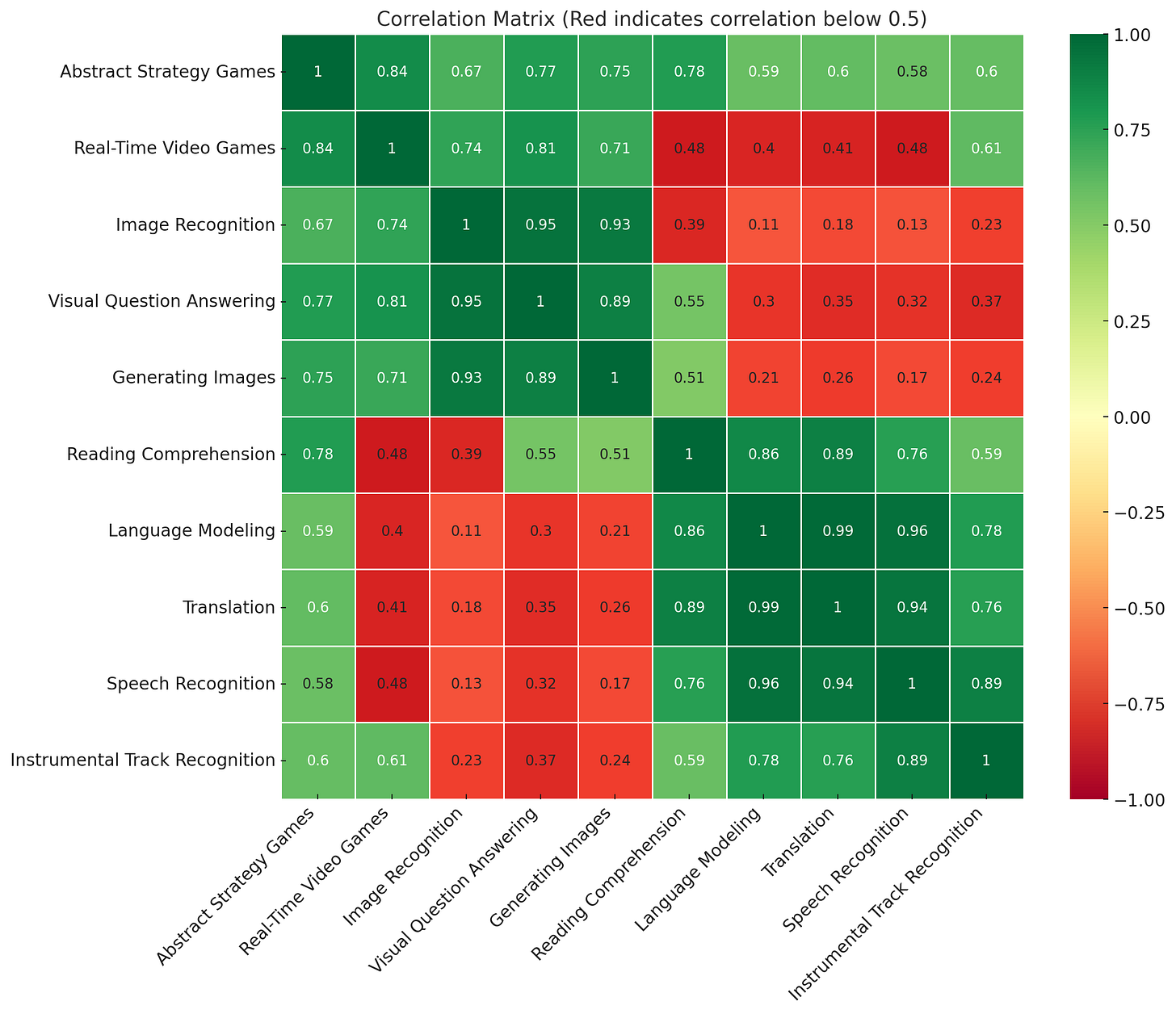





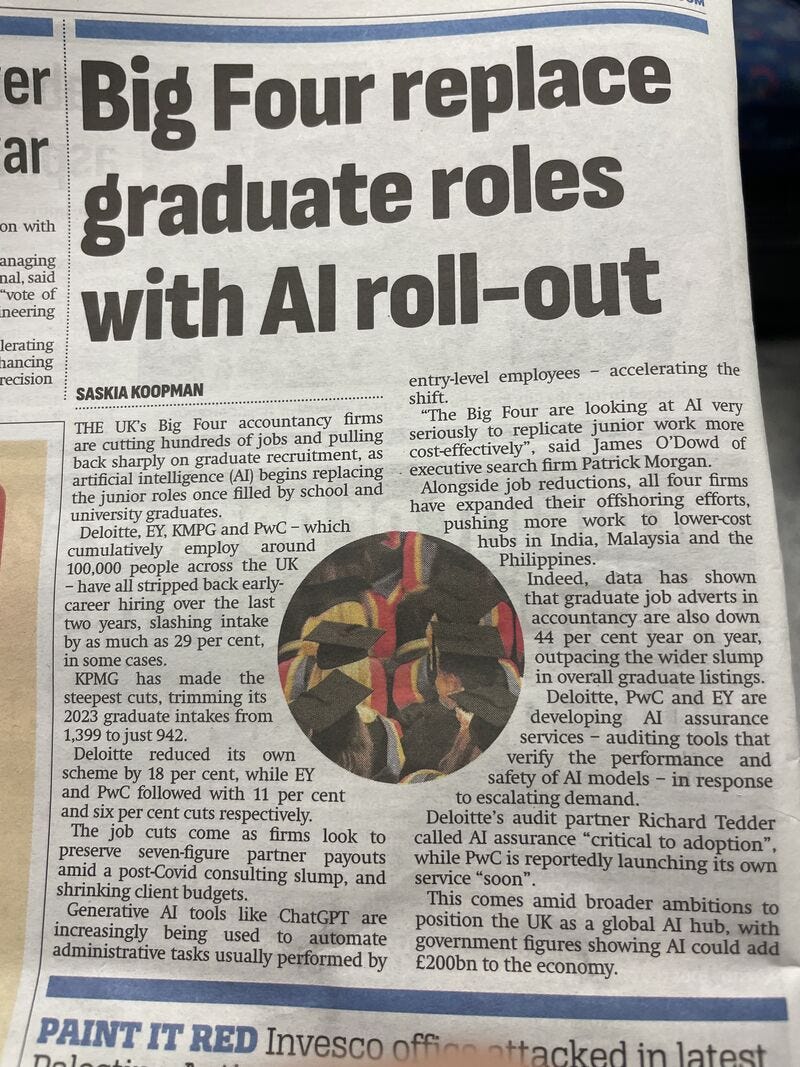
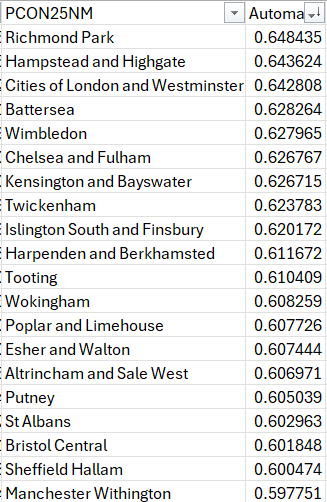
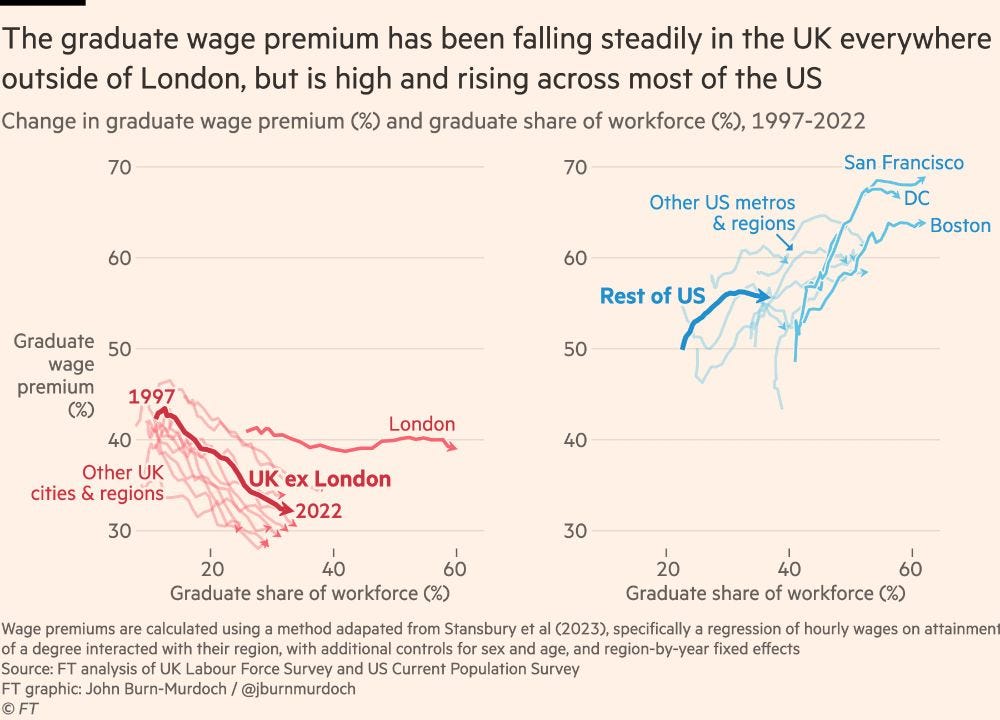

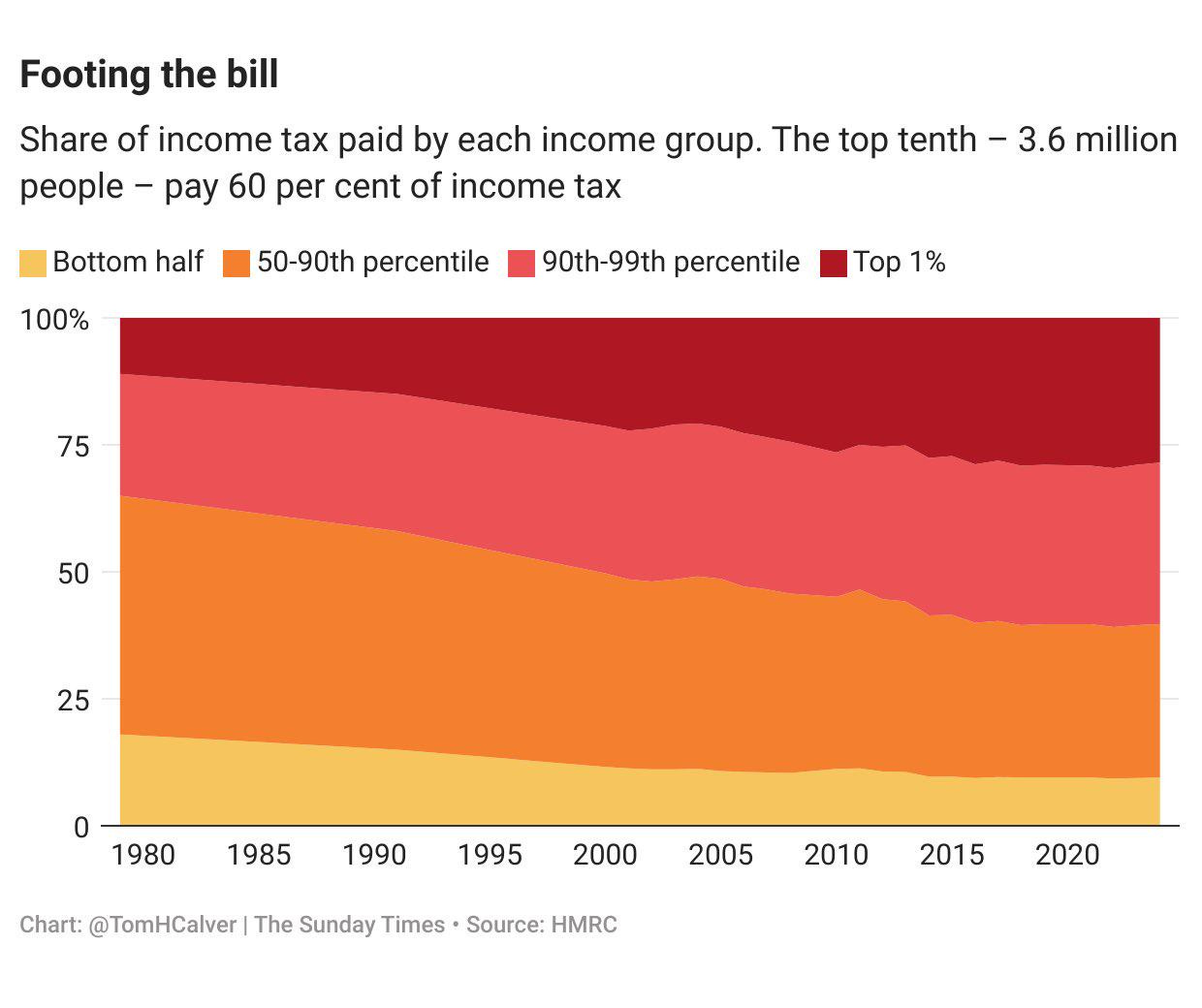
Really interesting. Middle class families have advantages getting their kids into Uni for largely academic courses that may now prove a career dead-end. If the best route shifts towards vocational training, will they still retain an advantage in getting their kids into such courses, displacing kids from more typically blue-collar families?
Amazing article, feels like our political parties and narrative are miles behind this.